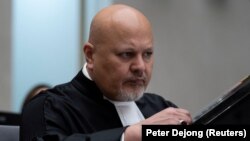On February 15, 2011, the Libyan Civil War began with anti-government demonstrations in Benghazi. Due to the violent response of the Libyan government against the protestors, little more than two weeks later, the United Nations Security Council referred the situation there to the International Criminal Court in the Hague. As a result, the ICC can exercise its jurisdiction over crimes against humanity and war crimes committed on the territory of Libya, or by its nationals, from 15 February 2011 onwards.
There is no doubt that in the ensuing 12 years, Libya has seen little peace. The war ended in October 2011, but another followed just three years later. In the chaos, terrorists attempted to gain a foothold there while warlords split the country, fighting over territory and oil fields. Caught in the middle of the violence was the civilian population. And in the meantime, opportunists of every stripe preyed on refugees from neighboring countries heading for Libya’s ports on the Mediterranean Sea, in hopes of a chance to cross into Europe.
It is therefore no surprise that a recent March visit by the UN Independent Fact-Finding Mission on Libya found “a wide array of war crimes and crimes against humanity” against Libyans and migrants, including “repression of civic groups, arbitrary detention, murder, rape, enslavement, extrajudicial killing and enforced disappearance.”
With this information in hand, the ICC was finally able to issue several new arrest warrants and file for additional ones.
“The work of the ICC in Libya plays a critical role in support of our collective pursuit of accountability, peace, and security,” said Mark Simonoff, United States Legal Adviser at the UN.
“The investigative and cooperative activities undertaken by the Office of the Prosecutor … have laid the foundations for accountability in the face of ongoing challenges in Libya and a difficult operating environment,” he said.
“Resolving political uncertainty and promoting accountability in Libya will go a long way towards addressing the chronic instability Libya continues to face,” said Mr. Simonoff.
“Human rights violations and abuses will continue unless meaningful steps are taken to address the chronic instability in Libya. A critical step towards peace and stability is the withdrawal of all armed groups and mercenaries from Libya without further delay.”
“The people of Libya deserve stability and justice,” said Mr. Simonoff, “and we support the International Criminal Court’s effort to help bring justice to the people of Libya.”














